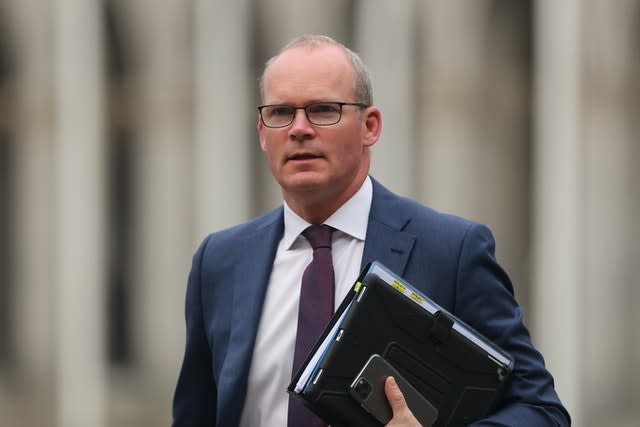Downing Street says Brexit law necessary to protect Northern Ireland peace
Downing Street has said new Brexit legislation is necessary to protect the Northern Ireland peace process if Britain is unable to secure a free trade deal with the EU.
Senior EU figures reacted with dismay after it was reported the Government was set to table new legislation which could override key elements of the Withdrawal Agreement which sealed the UK’s departure from the bloc in January.
It came as Boris Johnson set a five-week deadline for talks on a free trade deal to reach an agreement or for both sides to accept there will be no deal when the current transition period ends at the end of the year.
The Prime Minister’s official spokesman said the Government was proposing “limited clarifications” to the law to ensure ministers can preserve the gains of the Good Friday Agreement in the event of no deal.
The Internal Market Bill – to be tabled on Wednesday – will ensure goods from Northern Ireland continue to have unfettered access to the UK market while making clear EU state aid rules – which will continue to apply in Northern Ireland – will not apply in the rest of the UK.
In addition, an amendment to the Finance Bill will give ministers the power to designate which goods going from Great Britain to Northern Ireland are considered “at risk” of entering the EU single market and are therefore liable to EU tariffs.
The Prime Minister’s spokesman said discussions were continuing with the EU to resolve the outstanding issues relating to the Northern Ireland protocol, intended to ensure there is no return of a hard border with the Republic once the transition is over.
I trust the British government to implement the Withdrawal Agreement, an obligation under international law & prerequisite for any future partnership. Protocol on Ireland/Northern Ireland is essential to protect peace and stability on the island & integrity of the single market.
— Ursula von der Leyen (@vonderleyen) September 7, 2020
He said the legislative changes were a necessary “safety net” in the event that they were unable to come to an agreement.
“As a responsible Government, we cannot allow the peace process or the UK’s internal market to inadvertently be compromised by unintended consequences of the protocol,” the spokesman said.
“So we are taking limited and reasonable steps to clarify specific elements of the Northern Ireland protocol in domestic law to remove any ambiguity and to ensure the Government is always able to deliver on its commitments to the people of Northern Ireland.”
A UK official added: “If we don’t take these steps we face the prospect of legal confusion at the end of the year and potentially extremely damaging defaults, including tariffs on goods moving from GB to Northern Ireland.”

However, European Commission president Ursula von der Leyen warned there could be no backtracking by the UK on its previous commitments if it wanted to reach a free trade agreement.
“I trust the British Government to implement the Withdrawal Agreement, an obligation under international law and prerequisite for any future partnership,” she said.
“(The) protocol on Ireland-Northern Ireland is essential to protect peace and stability on the island and integrity of the single market.”
Ireland’s foreign minister Simon Coveney warned that abandoning the agreement would be “a very unwise way to proceed”.
The EU’s chief negotiator Michel Barnier said he would be seeking clarification about the UK’s plans.
He told French radio that honouring the Withdrawal Agreement was “a pre-condition for confidence between us because everything that has been signed in the past must be respected”.
Mr Johnson and French president Emmanuel Macron “agreed on the importance of making progress this month and reaching a conclusion on talks quickly” during a call on Monday, Downing Street said.
Mr Macron tweeted that it had been a “very good discussion”.
The Prime Minister’s spokesman insisted the Government was not seeking to backtrack on previous commitments.
Read my statement on our final phase of negotiations with the EU. https://t.co/dG0mZAUQtw
— Boris Johnson (@BorisJohnson) September 7, 2020
“We are fully committed to implementing the Withdrawal Agreement and the Northern Ireland protocol and we have already taken many practical steps to do,” he said.
At the same time, he said that Mr Johnson had made clear that they needed to see progress this week when talks on a free trade deal resume in London.
“We can’t be in the same position as we are now by the end of the upcoming negotiating round if we are going to reach an agreement in the time available,” the spokesman said.
“As the PM is setting out today, there needs to be an agreement by the time of the European Council on October 15 if it is going to be in force by the end of the year.
“Reaching a deal at the eleventh hour is not an option.”
In a statement, Mr Johnson said he would not compromise on the “fundamentals” of what made Britain an independent nation and that no deal would still be a “good outcome” for the UK.
“We will have the freedom to do trade deals with every country in the world. And we will prosper mightily as a result,” he said.
Mr Johnson said there was “still an agreement to be had” if the EU was prepared to accept a “standard” free trade deal along the lines it had agreed with countries such as Canada.
“Even at this late stage, if the EU are ready to rethink their current positions and agree this I will be delighted,” he said.
“But we cannot and will not compromise on the fundamentals of what it means to be an independent country to get it.”

